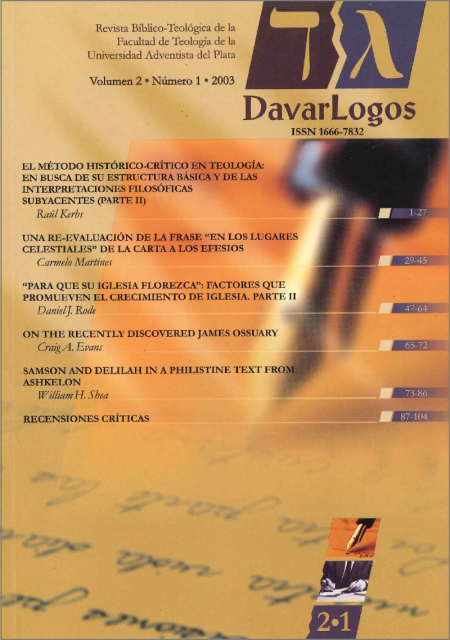EL MÉTODO HISTÓRICO-CRÍTICO EN TEOLOGÍA: EN BUSCA DE SU ESTRUCTURA BÁSICA Y DE LAS INTERPRETACIONES FILOSÓFICAS SUBYACENTES (PARTE II)
Resumen
Por medio de un análisis de la crítica histórica y literaria de las Escrituras en Troeltsch, Bultmann, la crítica de la tradición y la crítica de la redacción, el presente estudio se propone culminar el intento, iniciado en la primera parte, de descubrir la estructura esencial del método histórico-crítico, más allá de las distintas metodologías utilizadas por los críticos bíblicos. Asimismo, se trata de mostrar que dicha estructura se ha constituido gracias a una interpretación de la realidad (ontología) y del conocimiento (epistemología) sin la cual el método no puede funcionar. Al poner de manifiesto que esa interpretación ontológica y epistemológica no proviene del texto bíblico, el presente estudio quiere llamar la atención, en primer lugar, a la necesidad de una crítica radical del método que ponga en cuestión su interpretación ontológica y epistemológica subyacente y, en segundo lugar, a la necesidad de una metodología exegética que se apoye conscientemente en la interpretación bíblica de la ontología y de la epistemología.AbstractBy analyzing the historical and literary criticism of Scripture in Troeltsch, Bultmann, tradition criticism and redaction criticism, this study complements the analysis begun in Part I of describing the underlying philosophical structure of historical criticism, beyond the various methodologies used by biblical scholars. In the same vein, the study attempts to show that such a structure has developed due to a specific interpretation of reality (ontology) and of knowledge (epistemology), without which the method is not able to function. By showing that such ontological and epistemological interpretation does not arise from the biblical text itself, the following observations should be made: firstly, the need of a radical criticism of the method that may question the underlying ontological and epistemological interpretation and, secondly, the need of an exegetical methodology that roots itself consciously in the biblical interpretation of ontology and epistemology.Descargas
Los datos de descargas todavía no están disponibles.




